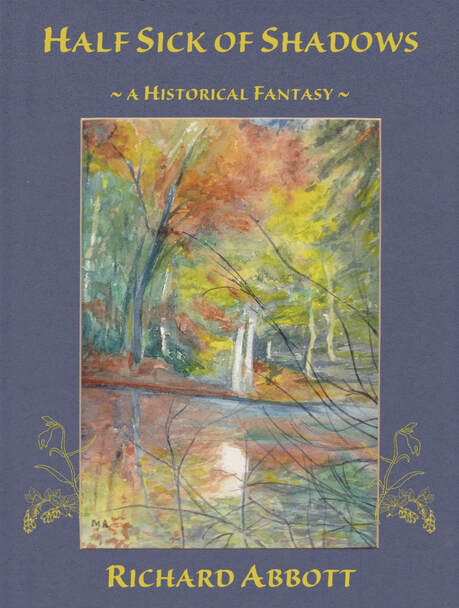|
There are a lot of great books at our fingertips these days – more than ever before. I’ve found myself exploring genres I wouldn’t have considered in the past. I’ve come to realize that classic literature cannot -- should not -- be the standard by which all books and genres are judged. However, there’s a reason certain books and writings are considered classic. Classics often do set standards. They convey timeless messages. They are forever relevant. Lady of Shalott is a poem by Alfred, Lord Tennyson. Written in the mid-1800s, it has been portrayed on stage, in paintings, and performed in countless public and private readings. Author Richard Abbott refers to his book Half Sick of Shadows as “a retelling – and metamorphosis” of Tennyson’s classic which, in turn, was inspired by even older stories and legends. Midway through Half Sick of Shadows, I decided to read Lady of Shalott. Somehow, it was missing from my repertoire, and I was curious. Half Sick of Shadows was so beautiful, haunting, lyrical. How would it compare to the original? The story (for both) centers around a lady confined to a tower. She can’t leave it. She sees everything happening outside the castle walls through a mirror. At first, she is accepting, content, at peace in her tower. But eventually, she grows restless. Tennyson’s version is the much shorter of the two. It’s a poem. Limited in focus, it flows beautifully. Camelot is there, in the background. Sir Lancelot makes an appearance. Half Sick of Shadows isn’t a poem. It’s a novel, albeit a short one, but it flows like poetry. As centuries pass, the lady sleeps and wakes, sleeps and wakes. The descriptions are so evocative and lovely that, while reading, I was as eager and anxious as the lady to see what changes had occurred in the landscape and people while she slept. We become closely acquainted with the lady, with her daily life, her thoughts and feelings. With each waking, she is more aware. The more she learns from the mirror, the more she wants. She yearns to interact with the people she sees, to share in a relationship, until the yearning is unbearable. While Tennyson’s lady clearly lives during King Arthur’s reign, this lady isn’t so bound by time. Her story begins in an earlier century and lasts longer. But there’s something else -- more than that, really, but I’ll tell you just one thing. She has a keyboard. So, bottom line? Lady of Shalott: I’m glad I read it, but I don’t particularly like it. Richard Abbott’s Half Sick of Shadows: I love it and look forward to revisiting it often. It’s unique. It’s timeless and beautiful. It’s a historian’s romantic poem of the ages. It’s a classic. Available at Amazon UK and Amazon.
0 Comments
Leave a Reply. |
A Little of This, a Little of ThatKeep me away from the wisdom that does not cry, the philosophy that does not laugh, and the greatness which does not bow before children. – Gibran Khalil Gibran Archives
April 2024
Categories
All
NewsletterFrom me to you with a smile. Thank you!You have successfully joined our subscriber list. |


 RSS Feed
RSS Feed